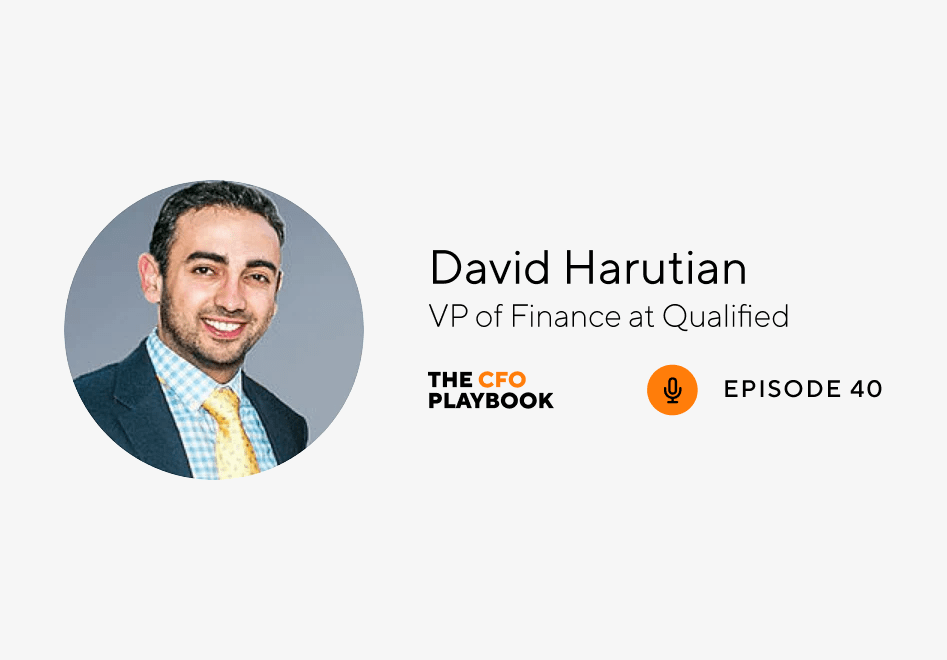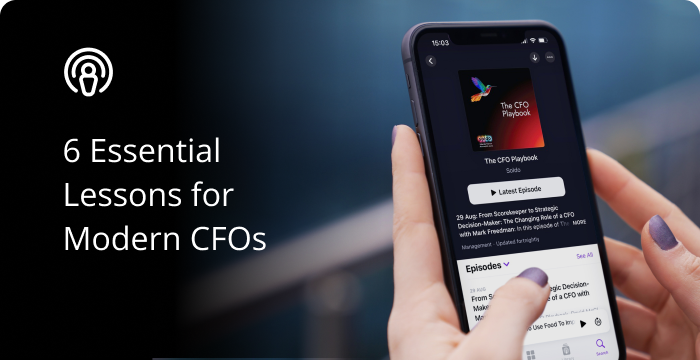There are a lot of paths you can take on your way to CFO: audit, investment banking, operations, sales…The key is to carry those lessons with you as you move up in your career.
David Harutian, VP of Finance at Qualified, a fast-growing conversational sales and marketing platform, made the leap from working in an adviser role in investment banking and corporate development to working in-house on the finance team. For him, the experience has been a ‘pleasant surprise:’
‘In an advisory role, you only get to see the tip of the iceberg and you get to advise on just this small sliver of the whole history of the company, which is the transaction. Whereas here, you’re working in the trenches, day-to-day and trying to understand, trying to help the executives plan things, trying to properly incentivise employees…There’s a lot more feeling essential.’
We interviewed David on The CFO Playbook podcast, where he shared his best advice for using an adviser mindset to help scale finance at a startup.
1. Understand your company from top to bottom
An adviser needs to dig in and get an understanding of all the nuts and bolts of a transaction in order to make recommendations.
David stresses that a finance leader at a hyper-growth company needs to do the same thing, but on a larger scale:
‘Get in the habit of understanding how to solve a problem that is unique to the company, and be able to build on that skill set to understand exactly what needs to be done.’
Your own company is the case study you should know the ins and outs of.
2. Build relationships with investors
When raising capital, prioritise investors that will become strategic partners to the business.
David has a lot of experience on both sides of fundraising deals from his time as an adviser and in his role at Qualified:
‘Building strategic partnerships with our investors was probably the most important aspect that we were going for rather than the highest valuation number. When you find the right investor who understands your business, they are able to also give you the right valuation as well.’
You also develop trust with your investors by making sure your numbers are accurate and your forecasts are reasonable.
3. Use technology strategically
The right data is key in decision-making and building accurate projections.
Before your company hits a hyper-growth stage, David underlines how important it is to invest in operations that support technology:
‘It’s a lot of investment upfront, but the insights that we come up with and the forecasting that we’re able to do are a lot more accurate than without that investment. We’re able to set more accurate targets and achieve them.’
You need to make sure everyone is communicating clearly and that data is flowing to the right locations. If not, you won’t be able to extract it and analyse it.
4. Appeal to candidates’ entrepreneurial spirits
Your experience working in other fields can help provide clarity when you’re building a team.
David’s experience as an adviser allowed him to see what’s needed to attract great candidates in the competitive world of tech startups:
‘We’re very transparent in letting [candidates] know what problems we’re facing and how their effort would be able to assist us in achieving these solutions and get us to the next level of growth.’
Let potential team members know that they’ll help solve problems that make an impact and you’ll help find those who share an entrepreneurial spirit.
5. In making projections, don’t neglect the macro
As tempting as it might be to continue to predict growth when your company is performing well, an adviser emphasises the importance of looking to the market to confirm predictions.
David zooms out as he shares his predictions for 2022:
‘[I predict] a lot of marketing spend, a lot of consolidation, barring any macroeconomic conditions. The IPO’s will most likely continue…So, we’re keeping that macroeconomic world in mind to understand what our growth needs will be and how we’re going to hit our company goals.’
Make sure you factor macroeconomic conditions into your year-end planning and projections.
Advisers keep the company’s best interests in mind
Top finance leaders don’t need to come from an adviser background to employ these strategies and be great business partners.
Thinking like an adviser means knowing the problems you’re helping to solve and keeping the goals and priorities of the business front and center at all times.
Sign up to The CFO Playbook Newsletter
Get extra insights from the podcast every Tuesday, to help you thrive in your business and career.











